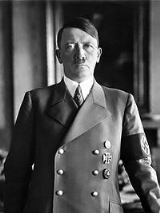
politician and the leader of the National Socialist German Workers Party ( (NSDAP), commonly referred to as the Nazi Party). He was Chancellor of Germany from 1933 to 1945, and head of state
(as Führer und Reichskanzler
) from 1934 to 1945. Hitler is most commonly associated with the rise of fascism
in Europe, World War II
, and the Holocaust
.
A decorated veteran of World War I
, Hitler joined the German Workers' Party
, precursor of the Nazi Party, in 1919, and became leader of the NSDAP in 1921.
1919 Adolf Hitler joins the German Workers Party.
1921 Adolf Hitler becomes leader of the National Socialist German Workers Party.
1921 The Sturmabteilung or SA is formed by Adolf Hitler
1923 Beer Hall Putsch: In Munich, Adolf Hitler leads the Nazis in an unsuccessful attempt to overthrow the German government.
1924 Adolf Hitler is sentenced to five years in jail for his participation in the "Beer Hall Putsch". However, he spends only nine months in jail, during which he writes ''Mein Kampf''.
1925 Adolf Hitler publishes his personal manifesto ''Mein Kampf''.
1932 Adolf Hitler obtains German citizenship by naturalization, which allows him to run in the 1932 election for Reichspräsident.
1933 Adolf Hitler is sworn in as Chancellor of Germany.
1933 The ''Reichstag'' passes the Enabling act of 1933, making Adolf Hitler dictator of Germany.
1933 ''Gleichschaltung'': Adolf Hitler bans trade unions.
The German Church and the People are practically the same body. Therefore there could be no issue between Church and State. The Church, as such, has nothing to do with political affairs. On the other hand, the State has nothing to do with the faith or inner organization of the Church. The election of November 12th would be an expression of church constituency, but not as a Church. answering C. F. Macfarland's The New Church and the New Germany
![]()
The church is certainly necessary for the people. It is a strong and conservative element.![]()
It will at any rate be my supreme task to see to it that in the newly awakened NSDAP, the adherents of both Confessions can live peacefully together side by side in order that they may take their stand in the common fight against the power which is the mortal foe of any true Christianity.![]()
The fact that the Vatican is concluding a treaty with the new Germany means the acknowledgement of the National Socialist state by the Catholic Church. This treaty shows the whole world clearly and unequivocally that the assertion that National Socialism [Nazism] is hostile to religion is a lie. ![]()
We want the people to be peace-loving, but also to be courageous.![]()
Just as the Jew could once incite the mob of Jerusalem against Christ, so today he must succeed in inciting folk who have been duped into madness to attack those who, God's truth! seek to deal with this people in utter honesty and sincerity. ![]()
In the Bible we find the text, 'That which is neither hot nor cold will I spew out of my mouth.' This utterance of the great Nazarene has kept its profound validity until the present day. ![]()

